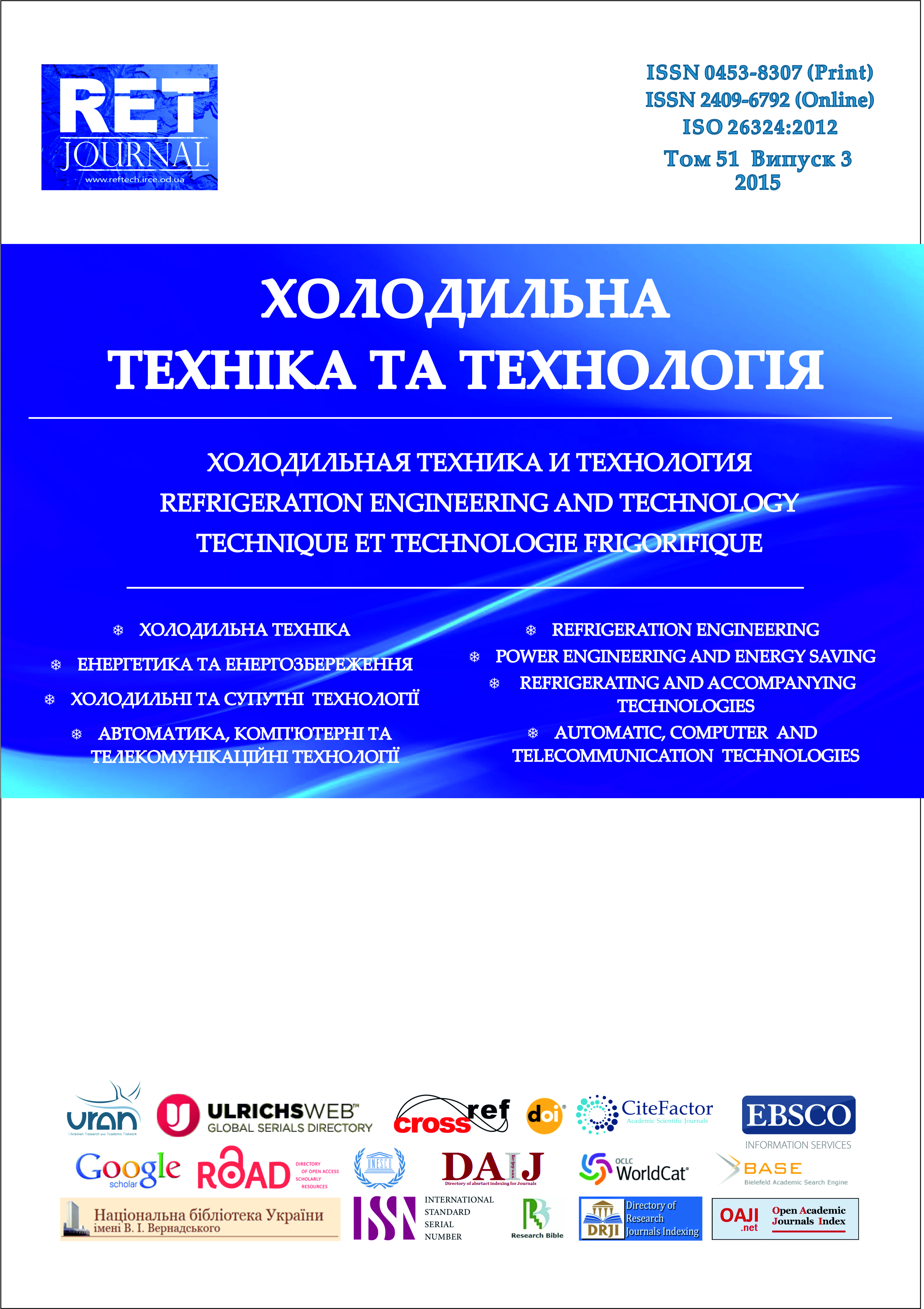THE DEPENDENCE OF THE EXERGETIC OUTPUT-INPUT RATIO OF AIR CONDITIONING SYSTEM FOR OPERATING CLEANROOMS ON COEFFICIENT OF TRANSFORMATION OF REFRIGERATION MACHINE
DOI:
https://doi.org/10.15673/0453-8307.3/2015.42636Keywords:
Exergetic balance, Air conditioning systems, Cleanrooms, Exergetic efficiency, Coefficient of transformation EERAbstract
Exergetic method is a universal way of thermodynamic research of various processes of energy transformation in energy technological systems, to which air conditioning system for cleanroom belongs. Implementation of exergetic analysis for energy technological system makes it possible to determine the influence of various elements of its system on its work and because of this to increase the effectiveness of work of energy technological system in general. Effectiveness of work of any air conditioning system depends on energy effectiveness of refrigeration machine, which serves it and consumes electricity for reducing the heat of supply air which enters the room. And it means that the main purpose of selection of certain refrigeration machine for air conditioning system is to reach the maximum cooling capacity with minimum energy consumption. Innovation mathematical research model of the implemented central straight flow air conditioning system for operating cleanrooms was used in this article. The aim of the model is to make computer estimation of exergy efficiency of existing air conditioning system depending on different factors, which have influence on its work, in particular the coefficient of transformation EER of its refrigeration machine. The dependence of the exergetic output-input ratio of implemented air conditioning system for operating cleanrooms on coefficient of transformation EER of its refrigeration machine by different parameters of outdoor and indoor air and the temperature difference between the indoor and supply air were presented. It is shown, that the implemented air conditioning system should be preferably used by higher coefficient of transformation EER of its refrigeration machine and higher difference between temperatures of indoor and supply air by various temperatures of outdoor air, that will give the opportunity to gain the highest exergetic output-input ratio , which means to gain the most advantageous economical variant of exploitation of implemented air conditioning system.
References
Fedotov A.E. 2003. Chistye pomeshcheniia. Vtoroe izd., pererab. i dop. – Moskva: ASINKOM, 2003. – 576 (in Russian).
Hayakava I. 1990. Chistye pomeshcheniia. Per. s iaponsk. – Moskva: Mir. – 456 (in Russian).
Whyte W. 2002. Tekhnologiia chistykh pomeshchenii. Osnovy proektirovaniia, ispytanii i ekspluatatsii. – Moskva: Klinrum. – 304 (in Russian).
Whyte W. 2004. Proektirovanie chistykh pomeshchenii. Per. s angl. – Moskva: Klinrum. – 360 (in Russian).
GOST ISO 14644-1. Chistye pomeshcheniia i sviazannye s nimi kontroliruemye sredy. Chast’ 1. Klassifikatsiia chistoty vozdukha (in Russian).
Sokolov E.Ia. 1981. Energeticheskie osnovy transformatsii tepla i protsessov okhlazhde-niia: ucheb. posobie dlia vuzov. – 2-e izd., pererab. / E.Ia. Sokolov, V.M. Brodianskii. – Moskva: Energoizdat. – 320 (in Russian).
Shargut Ia. 1968. Eksergiia / Ia. Shargut, R. Petela. – Moskva: Energiia. – 280 (in Russian).
Eksergeticheskie raschety tekhnicheskikh sistem. 1991: sprav. posobie / [V.M. Brodianskii, G.P. Verhivker, Ia.Ia. Karchev i dr.]; pod red. A.A. Dolinskogo, V.M. Brodianskogo; In-t tekhnicheskoi teplofiziki AN USSR. – Kiev: Nauk. dumka. – 360.
Brodianskii V.M. 1973. Eksergeticheskii metod termodinamicheskogo analiza / V.M. Brodianskii. – Moskva: Energiia. – 296 (in Russian).
Ber G.D. 1977. Tekhnicheskaia termodinamika / G.D. Ber. – Moskva: Mir. – 518 (in Russian).
Bogoslovskii V.N. 1985. Konditsionirovanie vozdukha i kholodosnabzhenie: Uchebnik dlia vuzov / V.N. Bogoslovskii, O.Ia. Kokorin, L.V. Petrov. – Stroiizdat. – 367 (in Russian).
Prokhorov V.I. 1981. Metod vychisleniia eksergii potoka vlazhnogo vozdukha / V.I. Prokhorov, S.M. Shilkloper // Kholodil’naia tekhnika. – № 9. – 37–41 (in Russian).
Shilkloper S.M. 1982. Eksergeticheskii analiz sistem obespecheniia mikroklimata i energosnab-zheniia / S.M. Shilkloper, S.I. Zhadin // Stroitel’stvo i arkhitektura. Ser. 9. – Vyp. 4. – 18–27 (in Russian).
SNiP 2.04.05–86. 1987. Otoplenie, ventiliatsiia i konditsionirovanie. – Moskva: TsITP Gosstroia SSSR. – 64 (in Russian).
Iantovskii E.I. 1988. Potoki energii i eksergii / E.I. Iantovskii. – Moskva: Nauka. – 144 (in Russian).
Bes T. 1962. Egzergia w procesach ogrzewania, klimatyzacji i suszenia / T. Bes // Energetyka Przemysłowa. – 10, № 11. – 388–392 (in Polish).
Łabaj Włodzimierz. 2002. Efektywność egzergetyczna autonomicznych klimatyzatorów miejscowych / Włodzimierz Łabaj, Oksana Omelczuk // XIV Konferencja ciepłowników „Perspektywy rozwoju ciepłownictwa”. Materiały konferencyjne. – Solina: Politechnika Rzeszowska, 26-28 września. – 137–144 (in Ukrainian).
Labai Volodymyr. 2000. Eksergetychna efektyvnist’ tsentral’nykh kondytsioneriv / Volodymyr Labai, Taras Ivanukh // V Konferencja naukowa Rzeszowsko-Lwowsko-Koszycka „Aktualne problemy budownictwa i inżynierii środowiska”. Zeszyty naukowe Politechniki Rzeszowskiej «Budownictwo i inżynieria środowiska». – Z. 32, część 2: Inżynieria Środowiska. – Rzeszów: Politechnika Rzeszowska, 25-26 września. – 229–235 (in Ukrainian).
Labay V.Y. 2014. Doslidzhennia eksergetychnoi efektyvnosti system kondyciiuvannia povitria chystykh prymishchenn’ / V.Y. Labay, D.І. Ha¬rasym // Naukovo-tekhnichnyi zhurnal «Kholo¬dyl’na tekhnika і tekhnologiia», № 4 (150). – Odesa: ONAKHT. – 47–53 (in Ukrainian).
Labay V. 2014. Innovation model for energy effective investigations of air conditioning sys¬tems for cleanrooms / V. Labay, D. Harasym // ECONTECHMOD – Lublin-Rzeszow: 2014 – Vol. 3, № 1. – 47–52 (in English).


